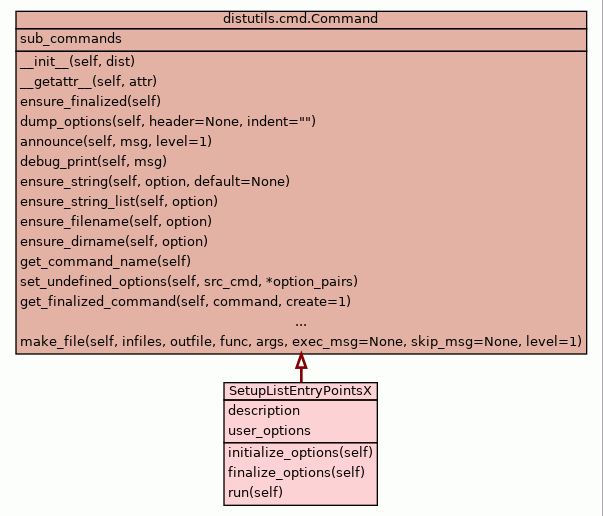
| Home | Top | ← | → | Overview | Module | Class | Index | Help |
|
About |
|---|
|
||||

List available entry points.
| Instance Methods | |
|
Inherited from |
| Class Variables | |
description = 'List available entry points.'
|
|
|
Inherited from |
|
| Method Details |
Define the API entrypoints and data of the command 'list'. REMARK: verbose and debug are encapsulated/hidden by distutils.
|
Initializae the API of 'lis'.
|
Creates documents. Calls the defined and activated wrapper scripts.
|
Create and initialize a new Command object. Most importantly, invokes the 'initialize_options()' method, which is the real initializer and depends on the actual command being instantiated.
|
Copy a file respecting verbose, dry-run and force flags. (The former two default to whatever is in the Distribution object, and the latter defaults to false for commands that don't define it.)
|
Ensure that 'option' is a list of strings. If 'option' is currently a string, we split it either on /,\s*/ or /\s+/, so "foo bar baz", "foo,bar,baz", and "foo, bar baz" all become ["foo", "bar", "baz"].
|
Determine the sub-commands that are relevant in the current distribution (ie., that need to be run). This is based on the 'sub_commands' class attribute: each tuple in that list may include a method that we call to determine if the subcommand needs to be run for the current distribution. Return a list of command names.
|
Special case of 'execute()' for operations that process one or more input files and generate one output file. Works just like 'execute()', except the operation is skipped and a different message printed if 'outfile' already exists and is newer than all files listed in 'infiles'. If the command defined 'self.force', and it is true, then the command is unconditionally run -- does no timestamp checks.
|
Set the values of any "undefined" options from corresponding option values in some other command object. "Undefined" here means "is None", which is the convention used to indicate that an option has not been changed between 'initialize_options()' and 'finalize_options()'. Usually called from 'finalize_options()' for options that depend on some other command rather than another option of the same command. 'src_cmd' is the other command from which option values will be taken (a command object will be created for it if necessary); the remaining arguments are '(src_option,dst_option)' tuples which mean "take the value of 'src_option' in the 'src_cmd' command object, and copy it to 'dst_option' in the current command object".
|
| Class Variable Details |
user_options
|
| Home | Top | ← | → | Overview | Module | Class | Index | Help |
|
About |
|---|
| Copyright(C) 2019 Arno-Can Uestuensoez @Ingenieurbuero Arno-Can Uestuensoez | https://arnocan.wordpress.com |
| Generated by Epydoc 4.0.4 / Python-3.8 / fedora27 on Fri Dec 13 10:44:02 2019 | http://epydoc.sourceforge.net |